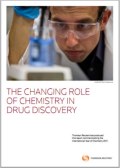 The role of the drug discovery chemist has changed significantly over the past 50 years – workflows have been reinvented while the same goals remain to find and test novel molecules that can reach and act on disease targets.
The role of the drug discovery chemist has changed significantly over the past 50 years – workflows have been reinvented while the same goals remain to find and test novel molecules that can reach and act on disease targets.
In this, the International Year of Chemistry (IYC 2011), Thomson Reuters offers a timely report, written by David Bradley with research by Robert Slinn, that examines how life in drug discovery has changed and how it will continue to change and adapt in the future. The report analyzes and develops the major themes identified and highlighted by key players in the global pharmaceutical industry. Many of their insights are fully supported by analysis of data taken from the Thomson Reuters Integrity SM drug discovery database for the period 2001-2011.
In this report, we ask who will emerge as the major drug discoverers and the major drug developers during the next decade. What is the driver for change in the industry and will globalization and regulation have far reaching consequences for the role of the chemist? How will the numbers stack up in 2020 when we count the number of new chemical entities (NCEs): will the balance shift from conventional small molecule Pharma products to the burgeoning area of biologicals?
Future skills
We will discuss how the future skills base will evolve and whether or not there will be a shift in the balance of traditional disciplines. We will calculate the ratelimiting steps and ask if that will affect changing role of chemists. Does a dearth of experience in Pharma, biotech, or academia impact on the changes and what role, if any, might the professional bodies play in the future development of the industry.
TR IYC2011 report available as a PDF here.